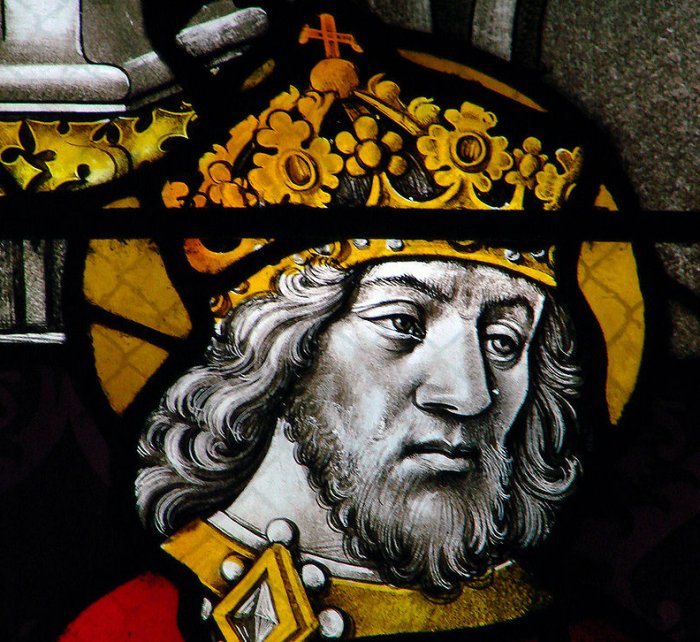Charlemagne – Most Famous Emperor Of Education And Enemy Of Pagan Worshippers – What Did He Really Mean For Europe?
A. Sutherland - AncientPages.com - Charlemagne, also known as Charles the Great (742 - 814), is considered the most remarkable of all medieval rulers in the history of the European continent.
His kingdom stretched to the territories today, including France, Germany, Benelux, part of Italy, and Switzerland; his contemporaries called him the 'Father of Europe.'
For some, he was a national hero. For others, he was the almost semi-legendary figure, and after his death - in a way - he was still alive. His life was remembered, and his achievements inspired the Crusades and later European leaders such as Louis XIV, Napoleon I, and Hitler. Even today, some people claim Charlemagne as the founder of European unity.
Charlemagne proved to be a talented diplomat and able administrator of the vast European kingdom he controlled. He was a true enemy of pagan worshippers.
Charlemagne was an enthusiastic promoter of literacy, respected education, and loved books. An excellent scholar in many other subjects, including language and mathematics, unfortunately, he never learned to write.
Charlemagne was born around 742, but his birthplace is unknown, although Aachen in modern-day Germany and Liege in present-day Belgium were proposed as possible locations.
Very little is known about his childhood. He was illiterate for much of his life. He studied grammar, rhetoric, and mathematics and learned to speak Latin and understand some Greek in addition to his native Frankish, but he had difficulties to learn to write.
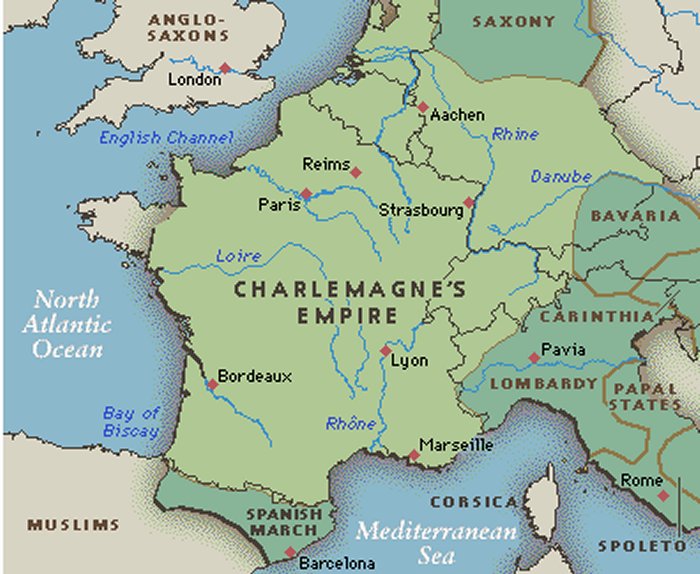
Charlemagne was a successful conqueror. He defeated the Lombards in northern Italy and made himself their king. He campaigned in Spain and Hungary.
He hired learned men to read out loud to him at dinner. We know from ancient historical records that he practiced writing on his wax tablets while in bed and then hid them under his pillows.
When his father, Pepin the Short (714 – 768), died, the kingdom was divided between Charlemagne and his brother Carloman. When his brother died in 771, Charlemagne became the leader of the reunified Frankish empire, which ruled from several cities and was engaged in many military battles during his reign.
He conquered Saxony in the 8th century, but winning the battle over the Saxons was not easy. He spread Christianity into Northern Europe by forcing Catholicism on the conquered people and slaughtering those who refused to convert. Charlemagne financially supported churches and protected the popes. He also made churches function as refugee shelters.
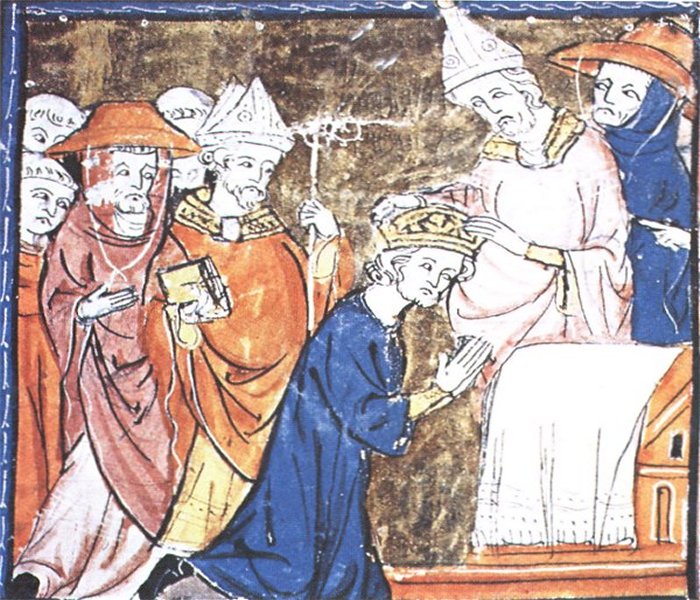
The coronation of Charlemagne by Pope Leo III. source
Pope Leo III acknowledged Charlemagne as a ruler, and in 800, at Mass on Christmas day at St. Peter's Basilica in Rome, he was named Roman Emperor.
Interestingly, Charlemagne began to use this title much later, probably because he feared it would create dependence on the Pope.
Charlemagne made many contributions to the future of European education. He sponsored the creation of a new uniform script for copying texts, developing textbooks for teaching Latin to non-Latin speakers, and collecting Latin manuscripts. Charlemagne also promoted learning that was given a time and a place to flourish. He set up monastic schools, supported authors and artists, and devised the pounds, shillings, and pence system used during the middle ages and in Britain until the 1970s.
Among his other achievements was the creation of the "Carolingian Miniscule," an alternative to the capital letters used in the Latin text.
Charlemagne died in 814 and was buried at the cathedral in Aachen. His empire encompassed much of Western Europe at the time of his death. He left control of his kingdom to his son, Louis the Pious.
His enormous cultural legacy has survived until today.
Written by A.Sutherland - AncientPages.com Senior Staff Writer
Updated on March 14, 2023
Copyright © AncientPages.com All rights reserved. This material may not be published, broadcast, rewritten or redistributed in whole or part without the express written permission of AncientPages.com
Expand for referencesReferences:
Fried J. Charlemagne
Becher M. Charlemagne
More From Ancient Pages
-
 Chonchon ‘Tue Tue’ Bird With Human Head Brought Bad Omens To Places It Haunted In Beliefs Of Mapuche Indians
Myths & Legends | Mar 12, 2024
Chonchon ‘Tue Tue’ Bird With Human Head Brought Bad Omens To Places It Haunted In Beliefs Of Mapuche Indians
Myths & Legends | Mar 12, 2024 -
 New Study Sheds Light On The Phenomenon Of Female Jewish Slavery And Uncovers Gang Rape In Livorno’s Slave Prison
Archaeology | May 18, 2022
New Study Sheds Light On The Phenomenon Of Female Jewish Slavery And Uncovers Gang Rape In Livorno’s Slave Prison
Archaeology | May 18, 2022 -
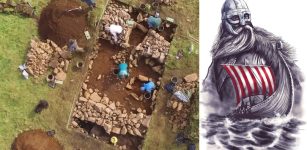 Possible Viking Boat Burials Discovered On The Isle Of Mull
Archaeology | Sep 12, 2022
Possible Viking Boat Burials Discovered On The Isle Of Mull
Archaeology | Sep 12, 2022 -
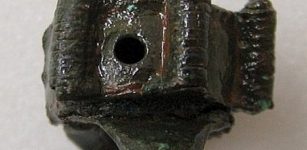 Bizarre Old Ring With License To Kill
Artifacts | Jun 29, 2014
Bizarre Old Ring With License To Kill
Artifacts | Jun 29, 2014 -
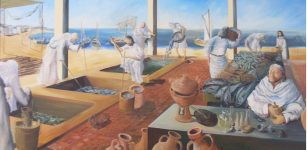 Mediterranean Hunter-Gatherers Relied On Marine Resources More Than Previously Thought
Archaeology | Feb 22, 2023
Mediterranean Hunter-Gatherers Relied On Marine Resources More Than Previously Thought
Archaeology | Feb 22, 2023 -
 St. Simeon’s Monastery And History Of Its Founder Shed Light On Christian Past In Anatolia
Archaeology | Nov 28, 2020
St. Simeon’s Monastery And History Of Its Founder Shed Light On Christian Past In Anatolia
Archaeology | Nov 28, 2020 -
 Megadrought That ‘Killed’ Green Sahara 4,000 Years Ago Crippled Southeast Asia’s Human Settlements
News | Aug 26, 2020
Megadrought That ‘Killed’ Green Sahara 4,000 Years Ago Crippled Southeast Asia’s Human Settlements
News | Aug 26, 2020 -
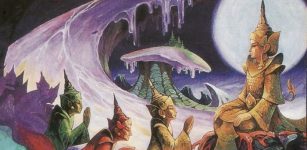 Kantyua And Tantyua – Sacred Tibetan Books Reveal Incredible Lifespan Of The Gods
Artifacts | Mar 18, 2019
Kantyua And Tantyua – Sacred Tibetan Books Reveal Incredible Lifespan Of The Gods
Artifacts | Mar 18, 2019 -
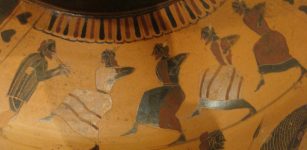 Dance Was A Gift Of The Gods To Ancient Greeks
Featured Stories | Oct 4, 2021
Dance Was A Gift Of The Gods To Ancient Greeks
Featured Stories | Oct 4, 2021 -
 Strange Case Of The ‘Impossible’ Glove Remains Unexplained – The Discovery – Part 1
Featured Stories | May 24, 2019
Strange Case Of The ‘Impossible’ Glove Remains Unexplained – The Discovery – Part 1
Featured Stories | May 24, 2019 -
 Vetala – Vampire With Knowledge Of The Past, Present And Future In Hindu Mythology
Featured Stories | Jan 19, 2021
Vetala – Vampire With Knowledge Of The Past, Present And Future In Hindu Mythology
Featured Stories | Jan 19, 2021 -
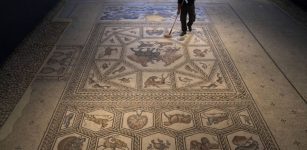 Exceptional 1,700-Year-Old Roman Mosaics Have Returned Home To Israel
Archaeology | Jun 27, 2022
Exceptional 1,700-Year-Old Roman Mosaics Have Returned Home To Israel
Archaeology | Jun 27, 2022 -
 Why Were These People Buried In A Remote, Unmarked Grave In New Hampshire In The Mid-1800s?
Archaeology | Nov 4, 2024
Why Were These People Buried In A Remote, Unmarked Grave In New Hampshire In The Mid-1800s?
Archaeology | Nov 4, 2024 -
 Saraswati – Hindu Goddess Of Knowledge, Learning And Vedic Symbol Of Speech, Vach
Featured Stories | Jun 23, 2021
Saraswati – Hindu Goddess Of Knowledge, Learning And Vedic Symbol Of Speech, Vach
Featured Stories | Jun 23, 2021 -
 Secrets Of The Spiral Symbol Left By Ancient Civilizations
Ancient Symbols | Mar 11, 2016
Secrets Of The Spiral Symbol Left By Ancient Civilizations
Ancient Symbols | Mar 11, 2016 -
 Which Came First: The Reptile Or The Egg?
Evolution | Jun 12, 2023
Which Came First: The Reptile Or The Egg?
Evolution | Jun 12, 2023 -
 Archaeologists Discover Long-Lost Scottish Monastery Of Deer And Solve An Old Manuscript Mystery
Archaeology | Nov 21, 2023
Archaeologists Discover Long-Lost Scottish Monastery Of Deer And Solve An Old Manuscript Mystery
Archaeology | Nov 21, 2023 -
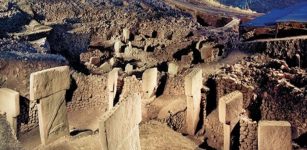 Hidden Geometric Patterns Found At Göbeklitepe – The Site Of World’s First Temple
Archaeology | May 1, 2020
Hidden Geometric Patterns Found At Göbeklitepe – The Site Of World’s First Temple
Archaeology | May 1, 2020 -
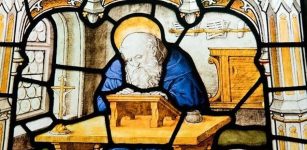 On This Day In History: Feast Day Of The Venerable Bede – Remarkable Priest, Monk And Scholar – On May 25, 735
News | May 25, 2016
On This Day In History: Feast Day Of The Venerable Bede – Remarkable Priest, Monk And Scholar – On May 25, 735
News | May 25, 2016 -
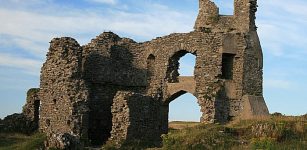 The Ruins Of Pennard Castle And The Tale Of Faeries’ Curse
Featured Stories | Mar 2, 2016
The Ruins Of Pennard Castle And The Tale Of Faeries’ Curse
Featured Stories | Mar 2, 2016

